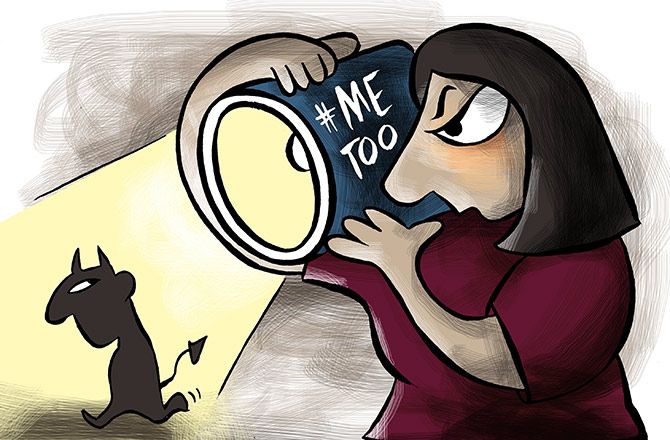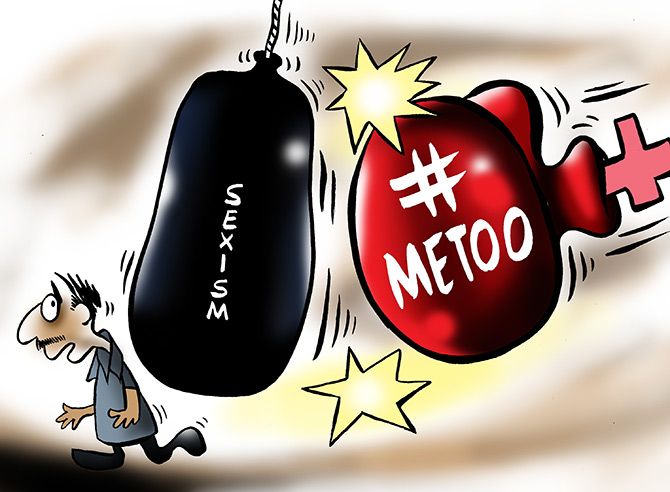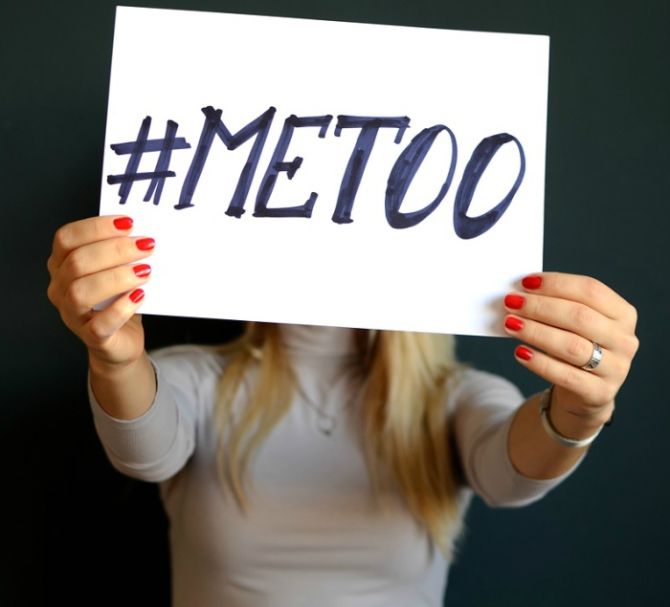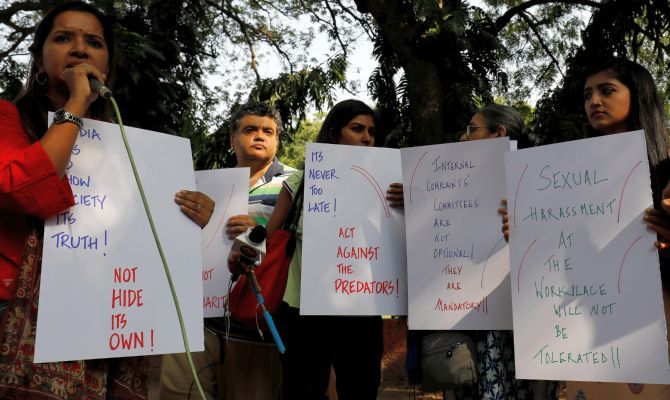A year ago, India's #MeToo movement witnessed women across India speak up against sexual harassment.
Nikita Puri assesses what, if anything, has changed.
Illustration: Uttam Ghosh/Rediff.com

In a high-rise steel-and-glass building in Gurugram, the conversation among colleagues is perhaps best described as casual.
"How stupid was it to get caught?" says a young man, "Who says these things on messages?"
He then tells his male colleague to proceed with caution, else he'll be "MeToo-ed".
A female colleague adds light-heartedly, "Tere ko andar karwa dungi zyada bakwas kia toh (I'll have you put behind bars if you spout such nonsense)."
A year after India's MeToo movement outed sexual harassers on social media, conversations like these have become commonplace, says Gigi Mathew (name changed on request), who works in that Gurugram high-rise.
"As soon as the movement broke, we had a session on what is considered harassment and the process of registering a complaint. But it was more a formality, nobody really paid attention," says Mathew.
If the #MeToo movement, led by equal rights activist Tarana Burke, took the US by storm in 2017, exposing men as powerful as Hollywood producer Harvey Weinstein for sexual misconduct, the movement rippled across India a year later.
But India's first round of call-outs happened in 2017, too, when a list of men who had allegedly taken advantage of their positions at various universities and colleges (List of Sexual Harassers in Academia, or LOSHA) made the rounds of social media.
Today, the result of this movement is most visible on the walls of workplaces across the country.
Employers are required by law to display prominently the details of the people on the internal complaints committee that is constituted to address a female employee's complaints under the POSH Act, aka the Sexual Harassment of Women at Workplace (Prevention, Prohibition and Redressal) Act of 2013.
Meanwhile, Mathew feels, "People are not more sensitive now, they are more scared."
Her male counterparts fear they'll be "misunderstood".
MeToo has become a verb, says the advertising professional of 10 years, "something you will be subjected to if you are not careful".

It's true that the kind of excitement and buzz that we saw last October and November have died down," says Ammu Joseph, an independent journalist and founder-member of the Network of Women in Media, India, an informal association of female media professionals.
"But in a way that was inevitable. In my view anything on social media inherently has a short shelf life. That's the nature of the medium."
According to Joseph, "What is referred to as the 'Me Too movement' may be more appropriately referred to as a moment or a phenomenon. It is difficult to maintain momentum -- let alone build a movement -- if the action remains online only."
Still, she says, the social media exposes have helped spread awareness about the prevalence of the problem, which is certainly a positive outcome.
A survey by Mumbai-based Complykaro, a startup that helps companies implement legal compliance, has found a 14% rise in the number of complaints under the POSH guidelines since the events of last year.
The data is from 100 BSE (Bombay Stock Exchange) companies.
A total of 823 cases of sexual harassment were reported in this financial year against 722 last year.
This is an indication that more women are aware of POSH, says Vishal Kedia, founder and director of Complykaro, as he exits a day-long workshop where he has been training senior members of a company on how an internal complaints committee should work.
He says there has been an uptick in demand for his company's services since the MeToo movement.
Social media saw women from across industries reporting inappropriate behaviour.
While some on Twitter opened up their inboxes so that women could safely and anonymously share their stories (for trolls thrive on the Internet like fungus in humid weather), accounts such as one called Scene and Herd came up on Instagram to specifically talk about misdemeanours in the famously closed and cliquish art circles.
The naming and shaming that ensued across media platforms jolted many out of their slumber.
Even as corporate houses opted for sensitisation seminars, a Bengaluru-based lawyer specialising in new businesses recounts how she had to ask young entrepreneurs to re-examine their 'cool' policies, such as having beer on every table in the office.
Tongues loosened by free-flowing alcohol bordered on inappropriate conversations (flirtatious as well as locker room trash talk), which made some female employees nervous about being in office in the absence of the bosses.
Companies have begun to take POSH seriously, says Sonal Mattoo, a Mumbai-based advocate who serves on several internal committees.
She is also the director at Helping Hands, a non-governmental organisation that helps companies implement policies against sexual harassment.
It isn't just the fear of reputational loss that's driving companies to make the workplace better, says Mattoo.
"Organisations, particularly start-ups, want to do the right thing and provide a safe environment for all employees, not just women. Policies have been made gender neutral.
Workshops are conducted frequently. Internal complaints committee members are accessible 24x7. It's beyond the tick in the box," she claims.

Institutional support has gone a long way in making workplaces better, say experts.
However, too many still agree that MeToo was largely limited to a heteronormative paradigm -- the reason why one early victory went almost unacknowledged.
In late September 2018, days before the naming and shaming of harassers turned into the high tide it did, Darjeeling's Gaurav Probir Pramanik took to Twitter to recount how one of the reasons he quit his job at Tech Mahindra's Noida office was a senior's constant mocking of his sexual orientation.
Pramanik left the company in 2015 after putting in five years.
"The saving grace was that I didn't have to face her every day because we were in different buildings, but on the same campus," he says.
Pramanik's recourse was limited since his harasser wasn't just a global head for one of the company's many departments, she was also the chief diversity and inclusivity officer at Tech Mahindra.
She also headed the company's anti-sexual harassment committee.
(Though the POSH law is designed for women, Kedia says mechanisms are in place for men to report, too.)
Shortly after the Supreme Court legalised consensual gay sex in September 2018, Pramanik wrote to his former senior, and then just as he had 'promised' to write 'the day IPC Section 377 was scrapped and being a homosexual in a country as great as India was no longer a crime'.
Pramanik then went public with his letter, prompting the company's top brass, including group chairman Anand Mahindra, to respond on the same platform to assure him of an investigation.
A few days later, Tech Mahindra's official Twitter handle addressed Pramanik saying the employee concerned (the woman who had harassed him) had been let go with immediate effect.
Last month Mahindra tweeted, 'Despite a strong Prevention of Sexual Harassment policy, the fact that we've had a few cases recently is distressing. I say clearly that @MahindraRise has zero-tolerance for any form of sexual harassment. If you flout the policy, there's no place for you here; and no place to hide.'

But there have been only so many victories, especially in the relatively fluid workspaces of the media industry.
All it takes is a Google search to find that those who've been accused multiply by women in our film industries are finding their way back to their professional lives.
Journalist Priya Ramani is currently fighting a legal battle after former Union minister M J Akbar filed a defamation suit against her.
The Delhi high court has directed Instagram to take down all allegations against the artist Subodh Gupta on the Scene and Herd account.
The artist is also seeking Rs 5 crore in damages.
It is in light of all of this that Network of Women in Media, India recently put out a statement highlighting the fact that these retaliatory lawsuits (Gupta's and Akbar's are only two of many) will deter people from speaking out.
"This is a form of backlash, it's the system's way of fighting back," says Joseph.
"Claiming huge damages doesn't seem to be an attempt just to salvage reputations. It seems to be more aimed at punishing and warning women who dare to reveal their experiences of sexual harassment in the public sphere."
Even as one tries to understand the extent of backlash, organisations such as Joseph's are trying to find a middle path between the naming-and-shaming route and legal recourse -- the former is arguably unfair and sometimes questionable, especially when made anonymously, and the latter not feasible for many given the time and monetary resources it demands.
The transition from social media movement to ground reality is a journey that still lies ahead.
Thankfully, the wheels are turning.










